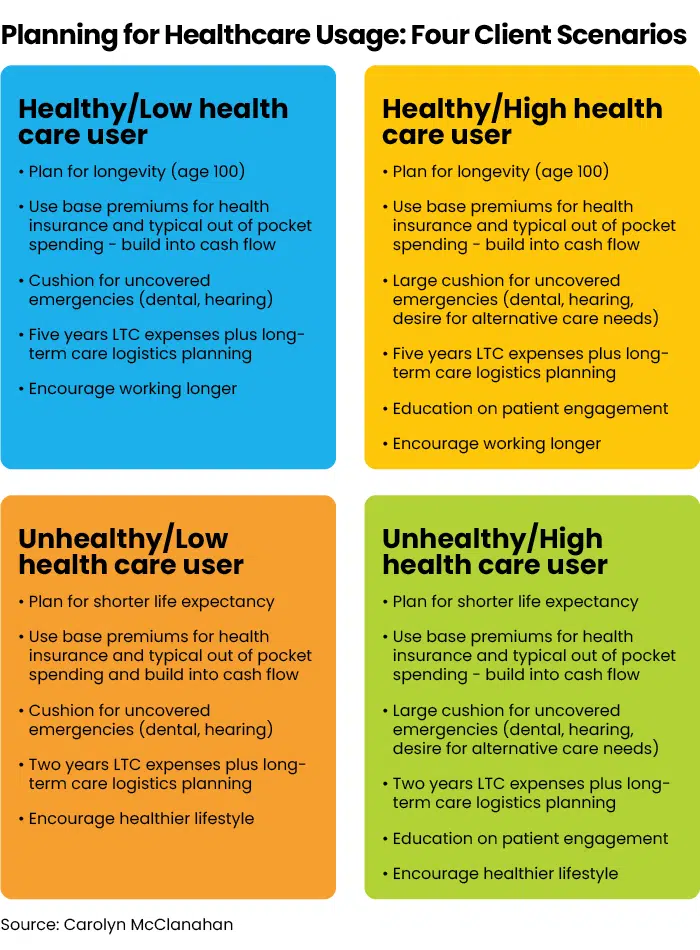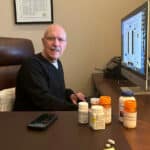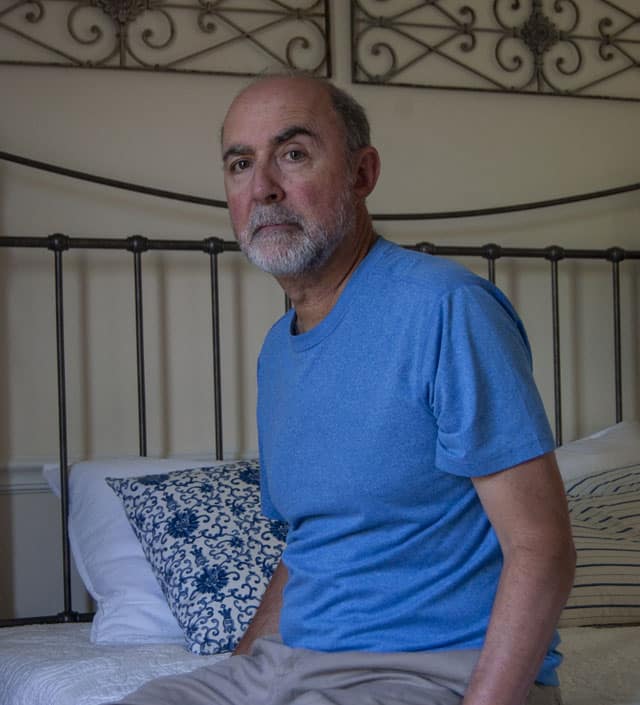Instead of losing even more sleep at night over the cost of staying healthy, better to have a long-range, realistic plan tailored specifically to a person’s lifestyle and finances, says Carolyn McClanahan, MD, CFP, a former emergency room physician with a financial planning practice in Jacksonville, Florida.
McClanahan was reacting to a recent report by the Employee Benefit Research Institute on out-of-pocket healthcare costs in retirement.
In an “extreme case,’’ a couple with high prescription drug costs, the report says, “will need to have saved $383,000 to have a 90 percent chance of having enough money to cover their health care costs in retirement.’’
“EBRI is very well-respected and it does a lot of great work, but with things like healthcare costs, you can’t create a blanket number for how much to save for in retirement. We are all different in how we use healthcare and in our life expectancy. Telling people they need $383,000 saved for healthcare in retirement is not useful,’’ McClanahan says.
Instead, she provides a chart that offers four client scenarios: healthy and unhealthy clients who are low healthcare users, and healthy and unhealthy clients who are high healthcare users.
“The chart is a great illustration of what we think about and how we take clients through planning healthcare costs,’’’ McClanahan says.
Areas used in planning include life expectancy, the cost of base premiums, the amount of a cushion for uncovered emergencies, the cost of either two or five years of long-term care, and whether a client continues to work past traditional retirement age.

Proactive or reactive
In her practice, McClanahan has seen healthy, very athletic clients who are intent on staying that way. Some of them spend $30,000 out-of-pocket yearly on healthcare, including alternatives such as acupuncture, massage therapy and a psychologist.
And you have examples such as her family, which didn’t go to a doctor until they were dying, versus her husband’s, which “goes to a doctor if they have a hangnail.’’ she says.
McClanahan’s firm, Life Planning Partners, Inc., analyzes a client’s healthcare use, and their overall cash flow.
“People will need more (in retirement) if they spend more. If they live longer, there’s a higher risk of dementia, so we project for that. But if you have somebody who’s unhealthy, the likelihood is they will not live to an old age and so the risk of dementia is reduced. They’ll die of heart attacks, strokes, diabetes, not old age,’’ she says.
McClanahan said people who are financially secure tend to be healthier because they can afford to take care of themselves.
“But I have one client who loves living large, and he’s very honest when we talk about his longevity expectations. He is good with that!’’
Advanced directives, geography and relationships
She recommends an advanced will directive, which 100% of her clients have. “We make sure clients do really good directive planning so they understand their healthcare choices at end of life. It can be very expensive at that point.’’
McClanahan says healthcare costs could be higher depending on where one lives.
In November 2022, Forbes reported that healthcare costs are lowest in Michigan, Washington State, Nevada, Hawaii and New Mexico, and highest in South Dakota, Louisiana, West Virginia, Florida and Wyoming.
“In general, the out-of-pocket expenses could be higher in certain areas but the bigger issue is: What a person does about healthcare usage will drive costs, says McClanahan.
“I still volunteer (in a medical clinic) and I had a patient who looked like she was 70, was well-dressed, and she told me she hadn’t been to a doctor in decades. She was 98: she looked great. She needed to have a big toenail cut because her shoes didn’t fit!”
“I always ask older people: ‘What is your secret?’ And the longevity studies say a big part of longevity is relationships. She [this patient] had this group that wrote plays and every Friday acted out the play. She was very social, very active. Between luck and taking good care of yourself, you have a chance of living a long time,” says McClanahan.
“As I say: ‘Live long and die quickly.’’’
Insurance headaches
The EBRI reports on the declining number of employer-provided health benefits to early (before 65) retirees: 3% of small private-sector companies offered health benefits to early retirees in 2021, down from 11% in 1997.
“I am seeing in general that more healthcare costs are pushed to the consumer, away from the employer. And there’s a lot more rationing of benefits by insurance companies. Some people say they don’t want the government rationing their healthcare, but do they want private companies rationing healthcare?” says McClanahan.
“There’s also slow walking of payments, or denying coverage for no reason. You have to fight to get it approved. It’s making medicine horrible for doctors to practice and painful for the patients caught in the middle,’’ she says.
Sad new world
McClanahan said the “delivery’’ of medicine has been encroached upon by venture capitalists, who are purchasing doctor practices such as dermatology and anesthesiology.
“They’re purchasing all of it for one purpose: to make money. They’re making doctors see more patients, which is slowing down patient care. In the past, 30 years ago, the family medical doctor was patient advocate; they’re no longer acting as advocate. It’s very time consuming and doing nothing to improve patient care. It’s totally built around billing.”
“I want to make it very clear that there are many, many good people who want to make it work, so it makes me sad because I love medicine,’’ McClanahan says.
Putting it all together
McClanahan’s perspective as a former doctor is a plus in helping clients navigating two arcane worlds: finance and medicine.
“We talk about how much they spend on healthcare, and people are comfortable doing that. If the advisor is comfortable, then the client is comfortable,” she says. “When I teach financial advisors how to bring up the healthcare conversation, I stress that healthcare is a big worry for a lot of people. One way is to talk a little about their health: how do they take care of their health and healthcare spending.”
She said getting a good picture of a client’s healthcare needs and history is not all that complicated.
“It doesn’t take that much time; it’s just another part of the cash flow analysis. You’re just asking basic questions; you’re not counseling them on their health or arranging healthcare for them. There are services out there that do that. You’re just teaching people how to be an advocate for themselves,’’ she says.
Until and if the costs of dental care, ear and eye health are covered by Medicare and supplemental plans, advisors need to caution their clients about out-of-pocket costs for these areas., says McClanahan.
“All of that is expensive. As you get older, your teeth need more care, so there can be a lot of unexpected expense in that. Or if you get macular degeneration that may not be covered.’’
Tradeoffs of Medicare Advantage
KFF reports that in 2022, 48% of eligible Medicare beneficiaries — 28.4 million people out of 58.6 million Medicare beneficiaries overall — were enrolled in Medicare Advantage plans.’’ As of January 2023, that number had increased to 30 million enrollees.
The EBRI study analyzed Medicare Advantage Plan data and found that the money saved from low ($18 per month) to no premium payments is reduced by more out-of-pocket costs and a narrower choice of networks, in Medicare Advantage plans.
“In general, savings targets tend to be lower for Medicare Advantage enrollees relative to Medigap enrollees, but there are tradeoffs for retirees to consider,’’ EBRI reports.
McClanahan said she cautions clients that Medicare Advantage “is great if you are well, but if you are sick, forget it, all bets are off.
“The reason people are going to Medicare Advantage is that it is being marketed very heavily by the insurance companies. What people do not know is that once you are in Medicare Advantage, you can’t get out,” she says. “They don’t tell you that if you want to go back to traditional Medicare, you have to undergo underwriting. If you’re sick, you can’t get a Medigap plan. I think they downplay that and people don’t understand that when they’re trying to get out.’’
The best medicine?
McClanahan, 58, has a sensible prescription for financial and emotional wellbeing: keep working as long as possible. She has clients who continue to work well into their 70s, and one, a doctor, worked until he was 83.
“People’s best basic asset is their ability to work; that’s human capital. The ideal way to prepare for healthcare expenses in retirement is to work as long as you can, ideally in a job you love, not that you hate!” she says.
“I encourage healthy people to work as long as possible; maybe just not as hard, and people are getting it: In my practice, one thing we do for a new client is to make sure they are doing what they like, that they’re happy in their job. We have helped a number of clients to transition to happier work. Then, when they’re tired of working as much, we work with them on a phased retirement.”
In a four-decade career in journalism, Eleanor O’Sullivan has reviewed many books on best practices for financial advisors, has written for Financial Advisor and the USA Today network, and was movie critic for the Asbury Park Press.







